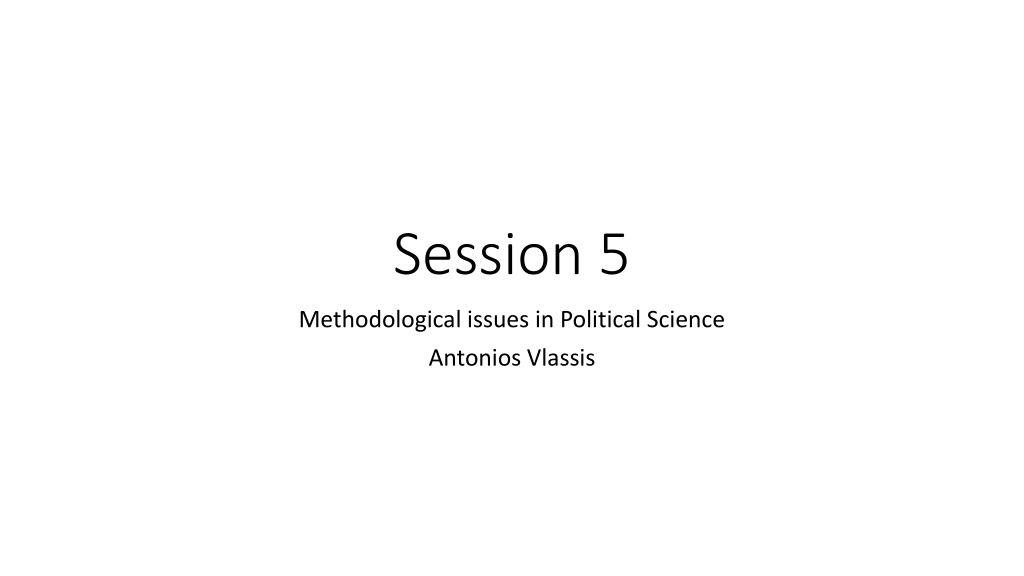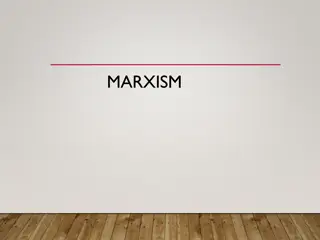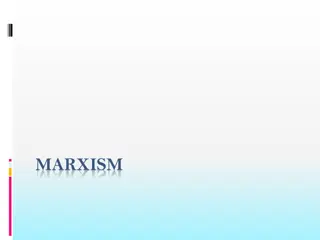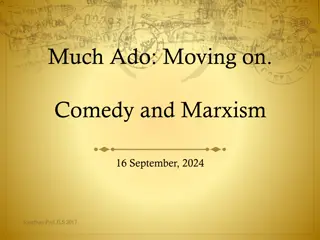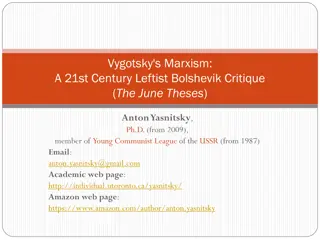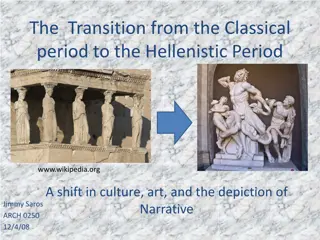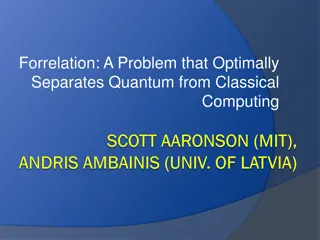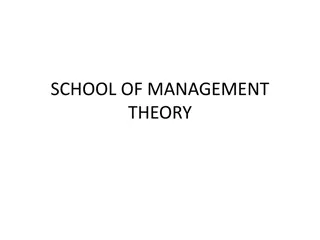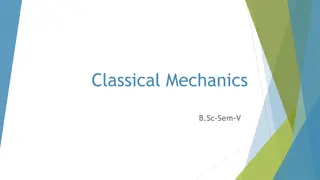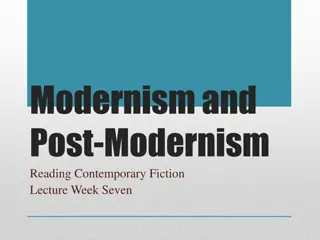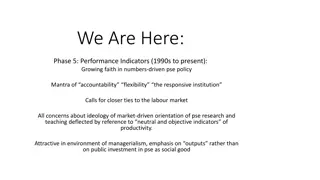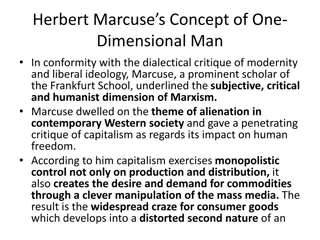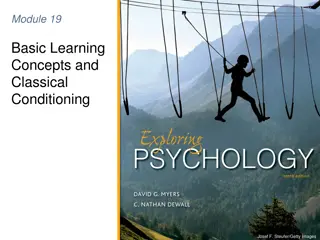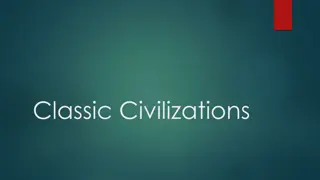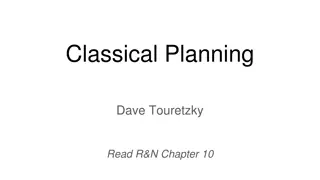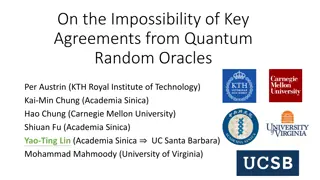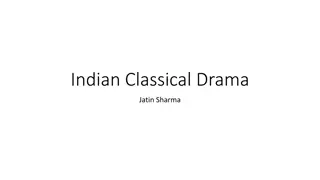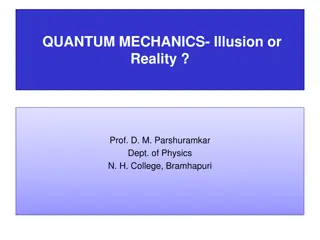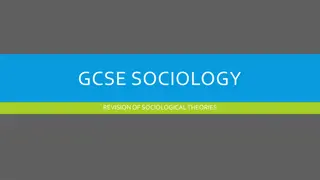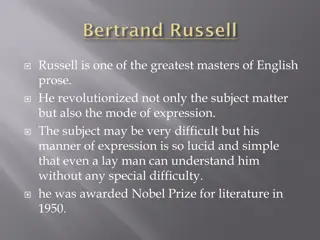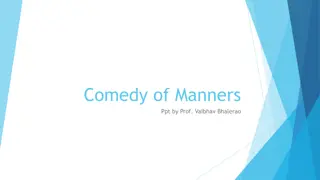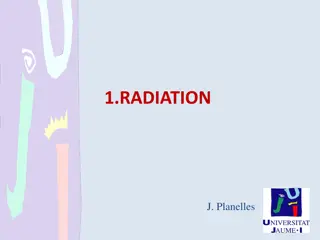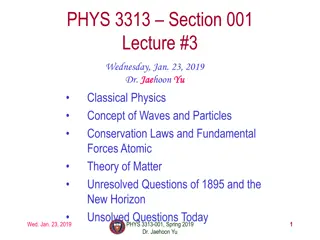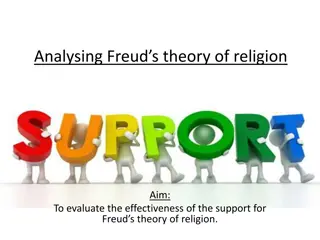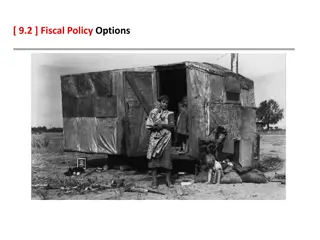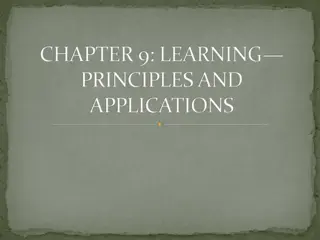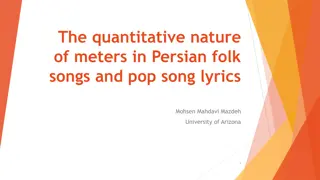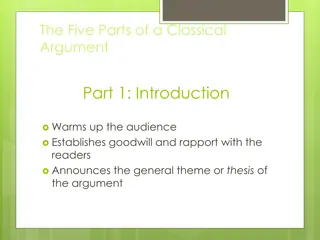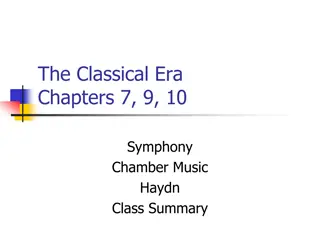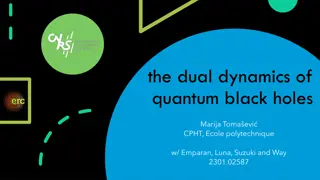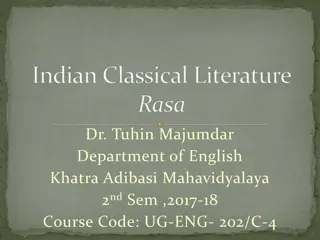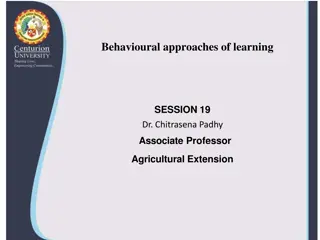Understanding Classical Marxism: Key Concepts and Critiques
Marxism, rooted in the ideas of Karl Marx, emphasizes the significance of economic relations in shaping social and political structures. Classical Marxism focuses on economism, determinism, materialism, and structuralism, viewing history through a lens of class struggle and offering an emancipatory vision of ending exploitation. This overview explores the core tenets and criticisms of classical Marxist thought.
Download Presentation

Please find below an Image/Link to download the presentation.
The content on the website is provided AS IS for your information and personal use only. It may not be sold, licensed, or shared on other websites without obtaining consent from the author. Download presentation by click this link. If you encounter any issues during the download, it is possible that the publisher has removed the file from their server.
E N D
Presentation Transcript
Session 5 Methodological issues in Political Science Antonios Vlassis
Marxism It is common at present to pronounce the death of Marxism. There is little doubt that Marxism is in crisis to the extent that it is out of fashion. What is the version of Marxism that was dominant for the first hundred years after Marx s death? Unlike the other approaches considered in this course, Marxism owes its origins and of course its name, to one man, Karl Marx. As such much of the debate within Marxism has revolted around attempts to interpret and reinterpret Marx itself.
Marxism There are four related -isms usually associated with classical Marxism: Economism, determinism, materialism and structuralism. Foundationalist approach in terms of ontology. Marxism is economist to the extent that it privileges economic relations and deterministic to the extent that it argues that economic relations determine social and political relations. He considers that political institutions, laws, belief systems and even the forms of the family would conform to the basic requirements of the economic system.
Marxism The economy caused or determined how the rest of the social system evolved and functioned. Economic relations determined social relations, that is, relations between classes, and social relations determined political relations, in particular the form and actions of the state. His position is materialist because Marx argues that material relations shape ideas and the dominant ideas at any time are those that forward the interest of the ruling class, that is, the owners and controllers of the means of production. Under this interpretation, Marxism is also structuralist to the extent that it contends that structures, particularly economic structures, determine the actions of agents. The main aim of Marxist approaches is to analyse the relationships between Capital, State and Labour. These forces are analysed as unified structures and their interactions are crucial in order to understand the main collective political outcomes.
Marxism And classical Marxism offers a position heavily criticized by recent anti- foundationalist interpretive thought Classical Marxism presents a theory of history; a view of the past, the present and the future and how they are related. Marxism has identified a theory of history that holds across time and space. The different Marxist approaches seek to discuss the degrees of economism, structuralism and materialism, the State autonomy vis- -vis capital, the role of coercion and consent in establishing and maintaining capitalist societies. Marxism has an emancipatory position because it has a vision of progress that will result in an end to exploitation. This emancipatory position influenced some interpretive theories.
Interpretive approaches Interpretive approaches to political studies focus on the meanings that shape actions and institutions and the ways in which they do so. Epistemology poses the question of how do we know what we know about political science Interpretive approaches constitute one set of answers to that question. Behind the different types of interpretive theory, there lies the shared assumption that we cannot understand human affairs properly unless we grasp the relevant meanings. After the SWW, political studies witnessed the emergence and gradual pre- eminence of behaviouralism and most recently rational choice theory, or even Marxist structuralism, all of which embody scientific ambitions.
Interpretive approaches All interpretive political scientists believe that political life consists of actions laden with meanings. Criticism to scientism (behaviouralism, rational choice theory). Interpretive political science provides a clear alternative. People act on their beliefs and preferences but we do not have external evidence of those beliefs. So when we try to explain the link between beliefs and actions, there is no causal necessity to that link equivalent to the explanations found in the natural sciences. However we can still explain social action.
Interpretive approaches Political studies should rely on a narrative form of explanation. We account for actions, practices and institutions by telling a story about how they came to be, a narrative about their construction and perhaps also about how they are preserved. Narratives are thus to political studies what theories are to the natural sciences. The varieties of interpretivism all treat meanings as contingent not natural or rational. This focus on contingency requires a historicist political science. If we are to explain actions and practices, we have to show how they happened historically to arise. Critical theory and post-modernism.
Critical theory Critical theory The starting point of critical theory is a tenet from Karl Marx. Philosophers have only interpreted the world in various ways, the point is to change it. This normative interest in identifying possibilities for social transformation is a defining characteristic of a line of thought which extends from Marx to critical theorists. Domination is a problem, a domination free society is needed. We need to question power, domination and exploitation. Critical theory is first referred to the Frankfurt s School and to the works of Adorno, Horkheimer, and to the University of Frankfurt s Institute for Social research in the years 1930-1959. Knowledge is always conditioned by historical and material contexts. It is always a situated knowledge.
Critical theory Critical theory takes theory and knowledge itself as its object of analysis. Theories and acts of theorizing are never independent of society. Critical theory s scope of analysis must necessarily include reflection on theory. Critical theory must be reflexivist. By drawing attention to the relationship between knowledge, society and power, which is so frequently excluded from mainstream theoretical analysis Critical theory recognises the political nature of knowledge claims.
Critical theory For the first time, we distinguish two conceptions of theory: traditional- problem-solving one and critical theory. Traditional conceptions of theory assume there is an external world out there to study. The research can leave behind any ideological beliefs values or opinions. Theory must be value free. By recognizing that theories are always embedded in social and political life, critical conceptions of theory allow for an examination of the purposes and functions served by particular theories. Knowledge cannot be objective and timeless in the sense that some rational choice theorists for example would like to claim.
Critical theory We need to look closely at each of those theories those ideas, that claim to be objective and value-free, and ask who or what is it for, what purpose does it serve? All the problem-solving (traditional) theories are for someone and for some purpose. Critical theory does not take institutions and social and power relations for granted but calls them into question by concerning itself with their origins. Critical theory attempts to challenge the prevailing order by seeking out, analyzing and, where possible, assisting social processes that can potentially lead to emancipatory change.
Critical theory Rational choice takes the world as it finds it, with the prevailing social and power relationships and the institutions into which they are organized as the given framework for action. It does not question the present order, but has the effect of legitimizing and naturalize this world. Knowledge is always constituted in reflection of interests (Ashley) Critical theory should focus on latent interests, commitments and values that give rise to and orient any theory. The study of politics is and always has been unavoidably normative, despite claims to the contrary. By adopting these reflexive attitudes critical theory is more like a meta-theoretical attempt to examine how theories and ideas are situated in a prevailing social and political order, and it examines the possibilities for theorizing in a manner that challenges the injustices and inequalities built into the prevailing order. . The scope is to denaturalize the present. Denaturalizing the objective realities opens the door to alternative forms of social and political life.
Foucault and post-modernism Foucault is hostile to the grandiose claims that characterise the so- called modern project. Criticism to modernity and to positivism. This project claims to ground our knowledge and ethics on objective and essential foundations. We try to understand the limits of this modern project. Foucault s work displays a continuing hostility to two modern concepts: the subject and reason Foucault s hostility to the modern project leads him to adopt an interpretive approach to social life. In opposing pure experiences, he suggests we have experiences only within a prior discourse.
Foucault and post-modernism The distinctive nature of Foucault s interpretive approach owes much to his hostility to the subject and reason. For a start, his hostility to the subject means he stresses the ways in which regimes of power and epistemes construct individuals and their beliefs. Foucault rejected the idea of an autonomous subject. He stresses the ways in which regimes of power construct individuals and their beliefs. These regimes of power are reinforced through education systems, the media, the medicine, the family. Power is everywhere, it is not related to the State and to some State organizations. This regime of power is relied on various institutions these regimes of power are the result of scientific discourse and institutions, of everyday practices, of medias, etc. A regime of power generates a set of structures, about what is normal, what is acceptable, what is deviant. For Foucault, the subject is a contingent product of a particular discourse, a particular set of techniques of government and technologies of the self. He stresses discourses rather than beliefs. So the objective is to show how the discourse arise out of the more or less random interactions of all sort of micro-practices.
Foucault and post-modernism Foucault has a huge influence in the Anglo-Saxon academic world especially in the 1990s and 2000. The majority of studies take from Foucault a mode of inquiry/research. The mode of inquiry is genealogies of the power/knowledge that informs current practices. These genealogies reveal the contingency of contemporary political practices, undermining any sense that they are neutral or inevitable. This normalisation of subjects takes place through diverse practices beyond the state action. All these studies seek to understand how dominant discourses in a given context establish particular subjectivities.
Interpretive theories Narrative is a form of explanation that works by relating actions to the dominant discourses, regimes of power and/or meanings. The main assumption is that there are conditional connections between beliefs, actions and discourses/tradition. Conditional connections exist when the nature of one object draws on the nature of another. They embody contingency. They have no arbitrary relationship. But they have no necessary relationship, so political science differs from the natural sciences. It means that the one does not follow from the other, so they do not have a necessary relationship. Interpretivists offer us narratives that seek to capture the way in which events did happen in the past or are today.
Interpretive theories Reflexivity (regarding the researcher and the object of analysis) Reflexivity is a practice of putting our behavior, beliefs, values and discourses into perspective and question. Bu highlighting the social origins and consequences of our activities, we enable the denaturalization of what appears to be normal , natural and usual . Reflexivity puts in question the normalization of a set of ideas, norms and practices that reinforce the status quo in societies and consequently the power relations of dominance and subordination. The reflexive attitude has developed in reaction to claims to value neutrality. Analysis of the political and social conditions in which the scientific work is produced. The essence of reflexivity is that social sciences are part of the social world; It can be neither separated from nor reduced to the social world, since the two are reflexively related through a process of mutual transformation. In contrast to conventional social scientific analysis, acknowledging the subjective element in one s analysis, which exists in all social science research, actually increases the relevance of the research.
Interpretive theories Knowledge as emancipation Some of the interpretivists (critical theory, feminism) support the proposition that researchers should transform themselves and the world. Interpretivist research cannot be separated from the historical movement for the improvement of lives out of which it emerged (especially social movements since 1960s, feminist movement, civic rights movement, gay rights movement, environmental movement, anti-globalization movement etc.). Researcher must be actively engaged in political struggle and be aware of the policy implications of his/her work. Interpretivists frequently engage in participant observation. They are generally suspicious of the High Science model where knowledge is obtained through measurement rather than sympathy. They believe that emotion and intellect are mutually constitutive and sustaining rather than oppositional forces in the construction of knowledge. Research practice of conventional social science claims to be detached and value-neutral and separate from political action.
Interpretive theories There can be little doubt that interpretive theories have made major contributions to political science. One of these contributions has been to focus on the link between knowledge and politics and to reject the idea of the scholar as objective observer. And a second contribution is to make us to rethink accounts of the modern state, community, sovereignty, gender, class. Namely to not take concepts for granted, and to provide an analysis of the dominant discourses of inclusion and exclusion. And the aim is to overcome the exclusionary dynamics associated with these binary identities. So it is an attempt to rethink the normative foundations of political science and of political reality. Interpretive theories remain one of the most fascinating and controversial ones in the human and social sciences.
